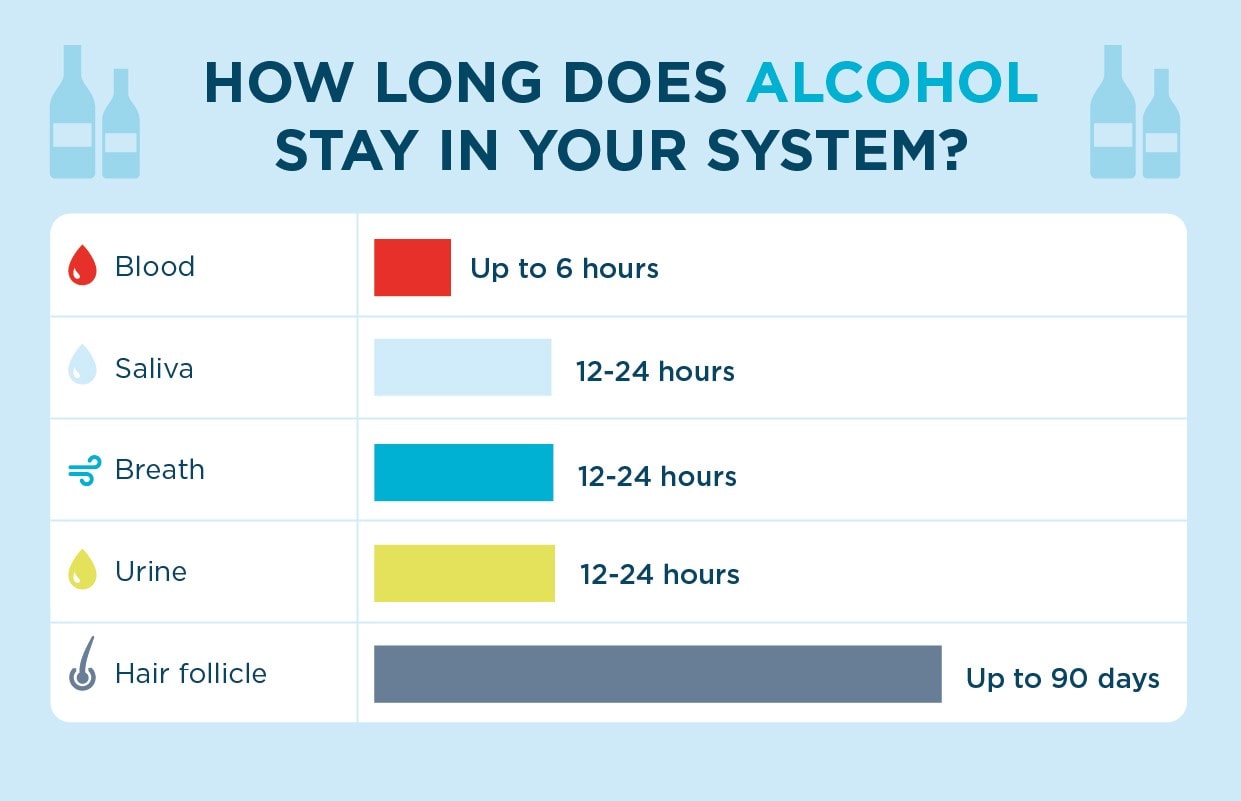How long does alcohol stay in your system?
After a drink, this is how long can you expect the alcohol to stay in your blood, urine and other areas of the body.
After a drink, this is how long can you expect the alcohol to stay in your blood, urine and other areas of the body.


When alcohol enters your system, your body will begin to metabolise it. Metabolism is the body’s chemical process for breaking down a substance to be absorbed or used as energy. This process happens when you consume any food or drink.
When you consume alcohol, the metabolising process is done primarily by your liver. On average, a person will metabolise the equivalent of one alcoholic drink per hour, but this can vary based on your weight, height, gender and body composition.
Read on to find out more about how long alcohol stays in your system, including parts of the body like blood, urine, saliva and hair.
The amount of time that alcohol can be detected in your system can vary depending on how much you’ve consumed, the type of test used and individual biological factors.
Alcohol detection tests can detect alcohol in your body for up to 6 hours after your last drink, while breath, saliva and urine tests can detect alcohol 12 to 24 hours after use. It can be detected up to 90 days after consumption in hair follicles.

When you take a test that measures how much alcohol is in your system, it’s not the total amount of alcohol drunk that’s measured. Alcohol tests measure your blood/breath alcohol concentration (BAC) levels. Your BAC shows the amount of alcohol in your bloodstream or breath, shown by how much ethanol (in grams) is in 100 millilitres of blood or 210 litres of breath.
BAC can be used in breath, blood or urine tests, and is usually displayed as a decimal. One standard drink typically increases BAC levels by 0.02 in the 45 to 60 minutes it takes for your body to absorb the alcohol (source). One standard drink is the equivalent to:
On average, your body is able to absorb one standard drink every 60 minutes – reducing your BAC levels by around 0.16. So, if you consume an alcoholic drink every hour, your BAC levels will continue to increase.
Many factors impact how long alcohol remains in your system, not least the amount of alcohol you have consumed. Some of the other things that might affect how long it takes your body to metabolise alcohol include:
Once you’ve had an alcoholic drink, you’ll likely start to feel the effects within just a few minutes. Alcohol starts to absorb in your stomach and small intestine very quickly after consumption. From there, it travels into your bloodstream, which then transports it across your entire body. When transported to the brain, alcohol can impair messages being made there, affecting your emotions, movement and senses.
The factors that impact how long alcohol stays in your system are at play again here. Body composition, your gender, if you’ve recently eaten and any medication you’re taking can all influence how quickly, and how severely, you feel the effects of alcohol once you’ve consumed it.
The rate of alcohol metabolism varies from person to person. While the body typically metabolises one unit of alcohol per hour on average, this doesn’t necessarily mean you’ll be fit to drive the next morning after drinking.
When considering driving after consuming alcohol, you should take into account several factors:
If you need to drive, it’s safest to avoid drinking any alcohol beforehand.
In England, Wales, and Northern Ireland, you're allowed up to 80 milligrams of alcohol for every 100 millilitres of blood, or 35 micrograms of alcohol for every 100 millilitres of breath you exhale.
In Scotland, the rules are stricter. You're only allowed up to 50 milligrams of alcohol for every 100 millilitres of blood, or 22 micrograms of alcohol for every 100 millilitres of breath.
In the context of drink driving limits, this measurement doesn't refer to the total amount of alcohol consumed, but rather the amount of alcohol per 100 millilitres of blood in your body. This concentration can be influenced by several factors including the amount of alcohol you've consumed, how quickly you've drunk it, your metabolism, your weight, and your sex, among other factors.
